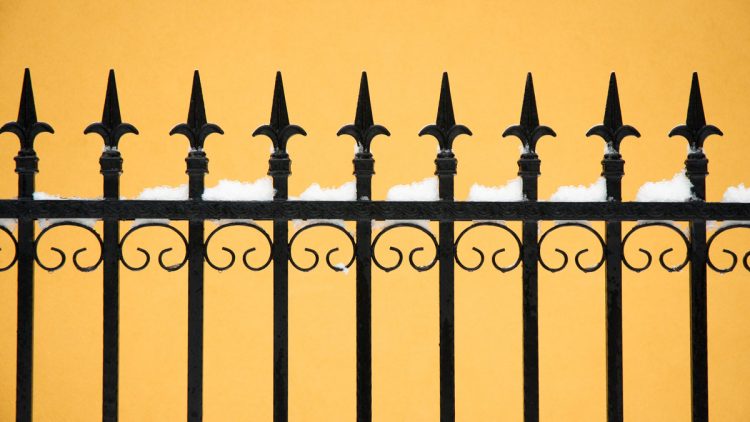The choice of metal for gates depends on various factors, including the gate’s intended use, location, and aesthetic preferences. Here are some common metals used for gates, along with their characteristics:
- Wrought Iron: Wrought iron is a classic choice for gates due to its timeless appearance and durability. It is known for its intricate designs and can be customized to suit various architectural styles. Wrought iron gates are often seen in elegant, ornate, and decorative designs.
- Steel: Steel is a versatile and strong metal that is often used for gates. It can be customized to achieve different looks, from modern and minimalist to ornate and decorative. Steel gates can be finished with various coatings to resist corrosion, such as powder coating or galvanization.
- Aluminum: Aluminum is a lightweight metal that is resistant to rust and corrosion. It’s a popular choice for residential gates, especially in coastal areas. Aluminum gates are available in a wide range of designs and can be painted or powder-coated to match your preferred color scheme.
- Bronze: Bronze gates are known for their rich, warm appearance. They are often used in decorative or historic settings. Bronze can develop a beautiful patina over time, adding to its aesthetic appeal.
- Copper: Copper gates have a distinctive reddish-gold color that weathers over time, developing a unique patina. They are often chosen for their visual appeal and their ability to enhance the aesthetics of a property.
- Stainless Steel: Stainless steel is highly resistant to corrosion and is an excellent choice for gates in areas with harsh environmental conditions, such as near the coast or in industrial settings. It has a modern and clean appearance.
- Corten Steel: Corten steel, also known as weathering steel, has a distinctive rust-like appearance that changes over time. It is popular for contemporary and industrial-style gates. The rusted surface actually protects the metal underneath from further corrosion.
- Galvanized Steel: Galvanized steel is coated with a layer of zinc to protect it from corrosion. It is often used for gates in outdoor settings, such as farm or industrial gates.
When selecting a metal for your gates, consider the following factors:
- Location: Think about the climate and environmental conditions in your area. Some metals are better suited for coastal environments, while others are more appropriate for dry or inland areas.
- Design and Aesthetics: Your choice of metal should align with the architectural style of your property and your design preferences. Metals like wrought iron and bronze are often chosen for their decorative qualities, while steel and aluminum offer versatility for modern designs.
- Maintenance: Consider the level of maintenance you are willing to undertake. Some metals, like aluminum and stainless steel, require less maintenance, while others, such as wrought iron, may need regular upkeep.
- Budget: Different metals vary in cost. Some are more affordable, while others, like bronze or copper, tend to be more expensive.
It’s essential to consult with a professional gate manufacturer or contractor to determine the best metal for your specific needs, taking into account factors like the purpose of the gate, the design of your property, and the expected maintenance requirements.
Our handcrafted gates will impress affluent property owners who want to invest in their home or business location.
When choosing metals for gates, it’s important to consider factors like durability, maintenance, cost, and aesthetic appeal. Some metals are less suitable for gates due to their properties. Here are some of the worst metals for gates and why they are not ideal:
1. Iron
- Susceptibility to Rust: Iron is highly prone to rust when exposed to moisture and air, which can compromise the gate’s structural integrity and appearance over time.
- Maintenance: Iron gates require frequent maintenance, including rust prevention treatments and painting.
- Weight: Iron is heavy, which can make the gate difficult to operate and require more robust supporting structures.
2. Mild Steel
- Corrosion: While stronger than iron, mild steel is still susceptible to rust and corrosion if not properly coated or galvanized.
- Maintenance: Requires regular painting or protective coating to prevent rust.
- Durability: Without proper treatment, mild steel gates can deteriorate quickly, especially in humid or coastal environments.
3. Tin
- Weakness: Tin is a very soft and weak metal, making it unsuitable for structural applications like gates.
- Durability: Tin gates would not be able to withstand impact or heavy use, leading to quick wear and tear.
- Corrosion: Tin is also prone to corrosion, particularly in the presence of moisture.
4. Copper
- Cost: Copper is expensive, which makes it impractical for large structures like gates.
- Softness: Copper is relatively soft and can be easily dented or damaged.
- Oxidation: Copper oxidizes over time, developing a green patina that, while sometimes desirable for aesthetic reasons, may not be suitable for all applications.
5. Brass
- Cost: Brass is more expensive than many other metals.
- Durability: Brass is softer than steel and iron, making it more susceptible to damage from impact or heavy use.
- Oxidation: Brass can tarnish over time, requiring regular cleaning and maintenance to keep its appearance.
6. Aluminum (without proper treatment)
- Strength: While lightweight, untreated aluminum lacks the strength of steel or wrought iron and can be easily bent or damaged.
- Corrosion: Although aluminum doesn’t rust like iron, it can corrode in the presence of salt, making it less suitable for coastal areas without proper treatment.
- Security: The lower strength of aluminum makes it less secure compared to stronger metals like steel.
Considerations for Choosing Metals for Gates
When selecting a metal for gates, consider the following:
- Climate: Metals that resist corrosion and rust are better for humid or coastal environments.
- Maintenance: Opt for materials that require less frequent upkeep.
- Strength and Security: Stronger metals provide better security and durability.
- Cost: Balance the initial cost with long-term maintenance expenses.
Better Alternatives
- Wrought Iron: Durable and strong, but needs rust protection.
- Galvanized Steel: Resists rust and corrosion, strong and durable.
- Stainless Steel: Highly resistant to rust and corrosion, low maintenance.
- Powder-Coated Aluminum: Lightweight, resistant to corrosion, and requires less maintenance than untreated aluminum.
By choosing the right metal for your gate, you can ensure it will be durable, low-maintenance, and aesthetically pleasing for years to come.
Phoenix Valley Ornamental Iron
From gates and stair railings to range hoods and entry doors Victory Metal Works will help you design, fabricate, and install the style of wrought iron or other alloy elements for your commercial or residential property. If you’ve got a home or business in the valley that could use new sturdy entry doors that are stylish and secure, we can help! No matter what metal architectural element you need we can help. Give us a call today to discuss your project 480-584-6220.
SCHEDULE A FREE CONSULTATION TODAY!
Victory Metal Works is Arizona’s leading manufacturer of custom wrought iron Entry Doors, Gates, Railings, Fences, Hardware and much more in Scottsdale, Paradise Valley and the Greater Phoenix area. Our experience in the construction industry allows us to make your dreams become a reality. Call us at 480-584-6220 to get your next project started today!






